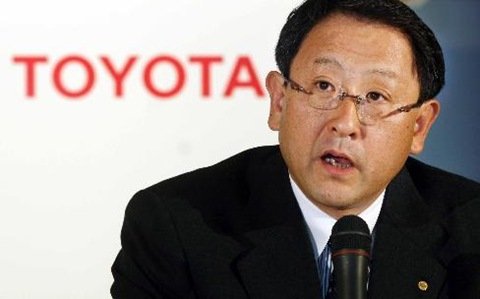Akio Toyoda Makes It Clear He's Not Happy About The EV Revolution

Lawyers all over the world love Latin expressions. One of the funniest around is "jus sperniandi," or the right to scream and complain about something. Akio Toyoda exercised that right in a recent Japan Automobile Manufacturers Association year-end press conference covered by the Wall Street Journal. He bashed electric cars and claimed they would kill businesses, demand huge investments, and emit more carbon dioxide.
Toyota's CEO was probably trying to push the Japanese government not to ban combustion-engined vehicles as other countries have. The rumor is that Japan will set 2035 as the deadline for ICE car sales in the country. It is not clear if hybrids and plug-in hybrids would still be allowed, as is the UK case.
This is probably the main reason for Toyoda to have attacked electric cars. His company is a long-time champion for hybrids as a safe transition towards electrification. When governments worldwide started banning ICE vehicles, Toyota promised to sell cars with solid-state batteries by 2025.
However, the bans will not be that patient, and Toyoda knows that. If his company is to remain relevant, it will have to start selling EVs by 2021. In fact, Lexus and Toyota were forced to do that in China way before that with the UX and the C-HR's electric versions, respectively.\
Toyota has tried selling EVs with Tesla battery packs and motors but gave that up long ago – it never said why. It is now trying to make fuel cell vehicles a passenger car alternative with the Mirai, but the hydrogen infrastructure will also demand huge investments. That said, it is strange Toyota brought that up as an issue restricted to electric vehicles powered by batteries.
Of all the three points he made, EVs emitting more carbon dioxide has already been proven as a fallacy multiple times, the last one in an epic way. He could have claimed concerns about lithium-ion batteries' safety, with thermal runaway risks. Or that mining may be an environmental and human rights concern. Yet, he apparently did not touch these subjects – perhaps because Toyota will have to use these cells in its EVs before solid-state batteries are ready.
On the other hand, EVs will indeed demand investments. Some of the governments banning ICE vehicles also have increasing bills due to breathing problems – the ones with universal healthcare, mind you. They probably prefer to spend that money on electricity generation.
It is also correct that they will kill the automotive industry as we currently know it, but electric cars will preserve personal transportation. Multiple jobs will be lost? Indeed, but new ones will be created. That was never the right excuse to avoid progress. Luddites became known when they broke machines that replaced workers during the Industrial Revolution, and they failed miserably.
Ever since, nobody attacked postmen or cut communication wires when Netflix killed Blockbuster. No one avoided buying smartphones or digital cameras to save Kodak and other film-making companies. That is very unlikely anyone will cry for car companies that are not able to reinvent themselves to offer better, safer, and cleaner products.
If Toyoda's ancestors could turn loom machine manufacturing into the most valuable car company in the world until very recently, it is not unlikely that Akio will also manage to turn the current ICE business into one based on electrification. Screaming about that is a right, but it won't help.
Related News


